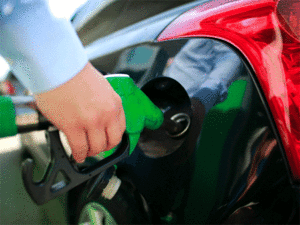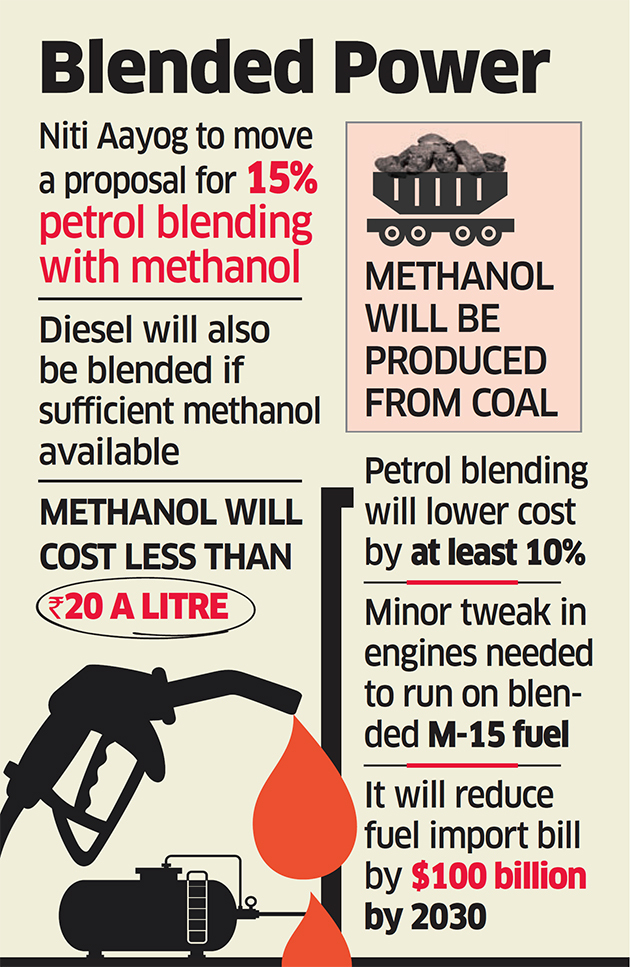By Yogima Seth Sharma, Rajat Arora ET Bureau | Updated: Aug 03, 2018, 11.29 AM IST

Niti Aayog has drawn up an ambitious ‘methanol economy’ roadmap.
NEW DELHI: Niti Aayog will soon pilot a cabinet note that seeks to make it mandatory for passenger vehicles to run on petrol blended with 15% methanol. If approved by the cabinet, this move will result in an at least 10% reduction in monthly petrol bills and help the government to substantially cut down its oil import bill.
A high-level meeting was held in last week of July to discuss the details of the proposal and a senior government official told ET that cabinet secretary PK Sinha is personally monitoring the progress on this front.
Niti Aayog has drawn up an ambitious ‘methanol economy’ roadmap.
The plan visualises an annual reduction of $100 billion in crude imports by 2030 if the country moves to 15% blended fuel, both for transportation and cooking.
At present, vehicles in India use up to 10% ethanol-blended fuel.
While ethanol costs Rs 42 a litre, the price of methanol has been estimated at less than Rs 20 a litre. A 15% blend could see petrol prices drop by about 10%.
The auto industry was guarded in its response to this proposal.

“Industry will have to take R&D projects to understand how much changes are needed in the engine as well as material compatibility… These days most fourwheelers are designed to run on up to 18-20% of blended fuel which currently is ethanol,” said Vishnu Mathur, director general of the Society of Indian Automobile Manufacturers (Siam), the industry body that represent auto companies.
Indian Oil Corp R&D director Dr SSV Ramakumar said technically methanol-blended petrol was ‘doable.’
“There are two challenges: the stability of the blended fuel, and its compatibility with the engine.
We have a solution for the first and for the second, the oil industry and the auto industry are working together on figuring out a solution,” said Ramakumar, who is also the convener of Niti Aayog’s task force on utilisation of methanol in transport fuel.
Another oil industry executive said the bigger challenge is related to supply of methanol.
“Importing methanol for blending in transport fuel will be like partly shifting our dependence from the Middle-East crude oil to Chinese methanol,” said this executive.
But official sources said methanol can be produced from abundantly available coal and other bio resources in the country besides being manufactured synthetically. This will ensure that the rising demand for methanol could be met going forward.
Government is considering roping in foreign companies, either at its own level or through private players, to meet the initial demand for methanol till India becomes self-sufficient over the next four years.
The department of science and technology is running three R&D projects worth Rs 100 crore in Pune, Hyderabad and Trichi for commercial production of methanol from coal.
Besides, a pilot project for commercial production of methanol is being readied in West Bengal and Jharkhand. Both the state governments have allotted a dedicated coal mine for this purpose.
Once the pilot projects are successful, government will roll out the commercial production of methanol from coal.
India is the third biggest oil importer globally. Its oil import stands at close to Rs 5 lakh crore with 2,900 crore litres of petrol and 9,000 crore litres of diesel consumed annually.
In addition to reducing fuel prices and the country’s annual oil import bill, the use of methanol will also help in reducing pollution. According to Niti Aayog, replacing 20% of crude consumption by methanol will bring down pollution in the country by more than 40%.
(With inputs from Sanjeev Chaudhary)

